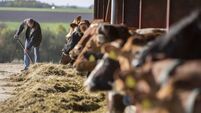Losing derogation could force one in eight families out of dairying
The assessment concluded that the loss of derogation would result in a €45bn cumulative loss in economic output between 2026 and 2035.
Industry figures warn that losing the nitrates derogation could cost the Irish economy €45bn, devastating rural communities, and forcing up to one in eight dairy farming families to quit the industry.
The warning comes as Brussels negotiations enter a decisive phase, despite evidence of progress on water quality.











